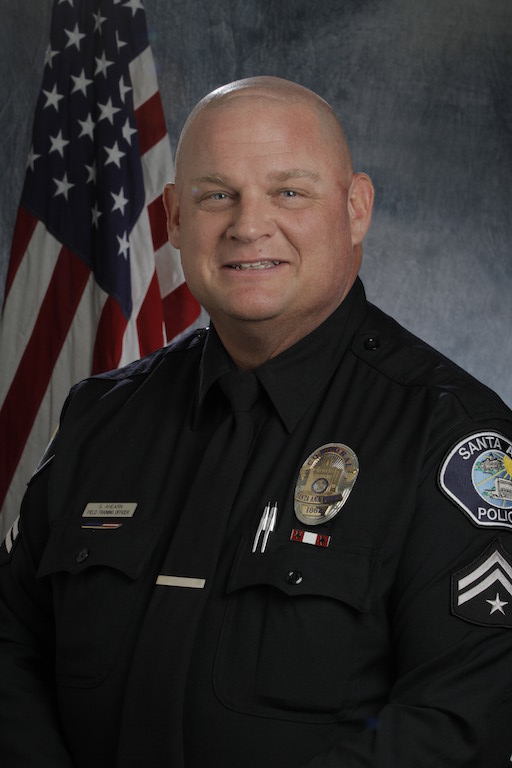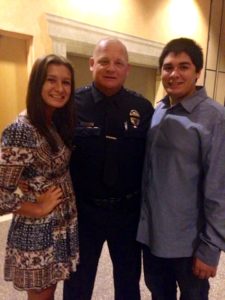Editor’s note: In honor of Behind the Badge OC’s one-year anniversary, we will be sharing the 30 most-read stories. This story was originally published Oct. 22.
Santa Ana Police Cpl. Steve Ahearn is issuing a “999” radio code throughout Orange County.
Officer Needs Help, Any Units Respond. Emergency.
For three decades as a cop, the first three years as a reserve, Ahearn has been in the position of helping others – a feeling, he says, “that is beyond words.”
He once saved a mentally ill woman from jumping to her death.
And he saved the life of a child who had turned blue after choking on an auto part.
Now, Ahearn’s the one who needs a lifeline.
“Here I am, an officer making the (999) call,” the former high school and college football standout said.
On Tuesday, Oct. 28, Ahearn will be among several speakers at a private ceremony at the Orange County Sheriff’s Academy to honor fallen officers and promote the state’s organ, eye and tissue donor registry.
Ahearn, 51, needs a new kidney.
“Although it’s hard for me to ask for help, if I get the help I desperately need, it’s going to save my life,” said Ahearn, who despite being on dialysis treatment for three years has continued to work full time.
“My doctor calls me a rarity,” said Ahearn, a divorced father of four adult children.
Tuesday’s event is co-sponsored by Donate Life California, the state-authorized nonprofit organization responsible for managing the Organ and Tissue Donor Registry, and the California Peace Officers’ Memorial Foundation.
In addition to Ahearn, scheduled speakers include Orange County Sheriff Sandra Hutchens, the heads of Donate Life California and the California Peace Officers’ Memorial Foundation, Riverside Police Chief Sergio Diaz (who lost officer Michael Crain last year in the Christopher Dorner rampage) and a handful of kidney transplant recipients and donors who work in law enforcement.
Donate Life California will present fallen officers’ families with a certificate and a rose in honor of their loved ones to be placed on the Donate Life float in the 2015 Tournament of Roses Parade in Pasadena on New Year’s Day.
For Ahearn, whose diagnosis has given him a new appreciation of life, every precious day is coming up roses.
But without a new kidney, those days are numbered.
Three-hour dialysis sessions three times a week keep Ahearn from going into renal failure and certain death, likely from congestive heart failure.
He said he’s probably looking at a 12-year wait for a new kidney from a deceased donor unless a living donor steps up who’s a perfect match. Such a match would rocket him up toward the top of the waiting list.
The news that Ahearn needed a new kidney was shocking and unexpected.
For about two months three years ago, Ahearn, who played football at Tustin High School and Saddleback College, noticed an unusually persistent cramp in his right calf muscle.
He saw his general physician, who thought Ahearn might have a blood clot and ordered an ultrasound.
While waiting for his ultrasound at St. Joseph Hospital in Orange, a doctor who reviewed Ahearn’s blood work delivered the life-changing news.
“You’re in renal failure,” he told Ahearn. “We’re admitting you now.”
At that time, at age 49, Ahearn had been enjoying decent health, despite having some issues with diabetes and high blood pressure.
He had been feeling fatigued pretty much every day, sure, but Ahearn wrote that off as the byproduct of working the graveyard patrol shift for years.
His doctor told him that some of that fatigue was caused by a failing kidney.
Ahearn opted to have doctors graft a vein in his left forearm into an artery and receive dialysis treatment via large needles that are placed into two portal entries.
He usually wears a long sleeve to hide the two entries on his forearm. Both have hardened and formed into numb, visible mounds on his arm.
“When they stick the needles in now,” Ahearn said, “I no longer feel a thing.”
Although he writes and does most other things with his left hand, Ahearn selected his left forearm for a reason.
“I shoot with my right arm,” the veteran cop said.
Originally from upstate New York, Ahearn changed his mind about joining the Army when he went on a ridealong with his older brother, a Santa Ana cop at the time, in 1983.
“I fell in love with it,” he said of police work.
He saw many parallels between being a cop and being a football player.
“There’s teamwork, there’s ‘us vs. the bad guys,’ there’s the camaraderie and there’s the adrenaline rush,” said Ahearn, who became a full-time officer with the Santa Ana PD in 1987.
As a Santa Ana Police corporal, Ahearn now wears three hats.
He coordinates a team of 15 field training officers (FTOs), he runs the 60-member Police Explorers program, and he’s also in charge of 50 people who make up the Santa Ana PD’s civilian volunteer program.
Ahearn recently received a Community Hero Award for his work with the Police Explorers, a position he took over in early 2013 when only nine participants were in the program.
The only gift he looks forward to now is a new kidney.
“I want to be able to do all those syrupy things like walk my daughters down the wedding aisle,” said Ahearn, who has two daughters ages 25 and 18 and two sons ages 22 and 20.
“This may sound weird, but in a way I’m thankful (I need a new kidney),” Ahearn said.
“It really has set my priorities straight.”
 Behind the Badge
Behind the Badge





